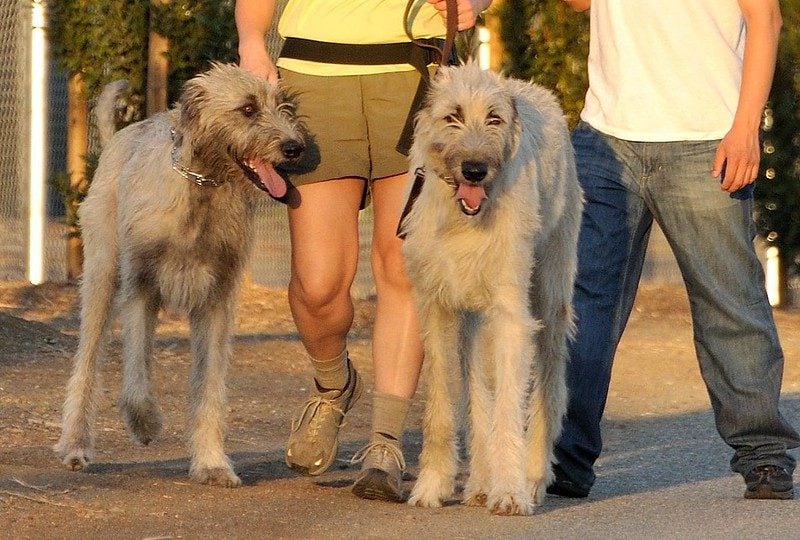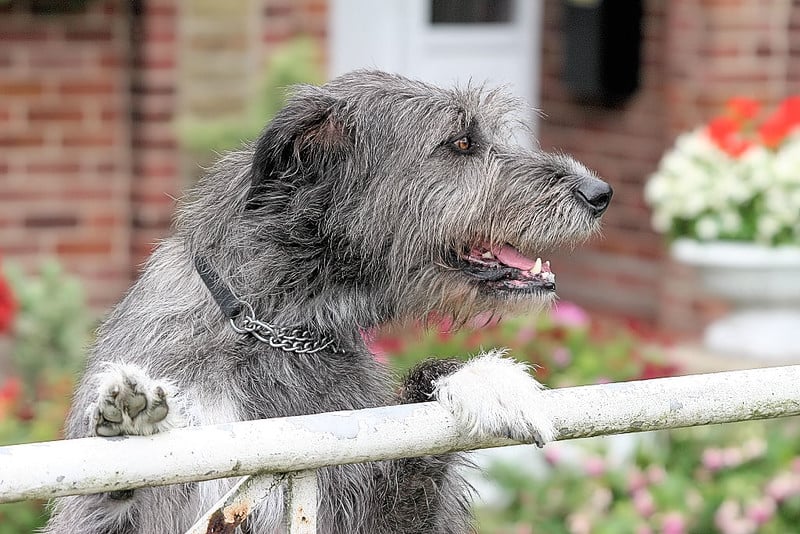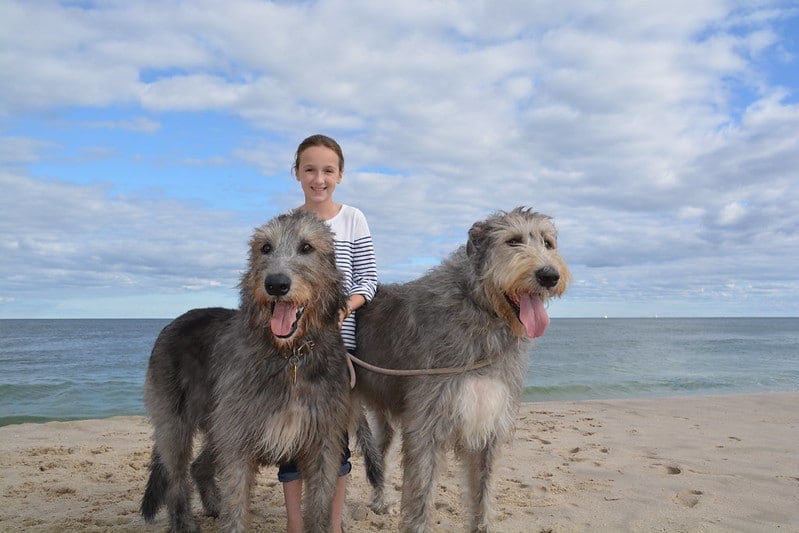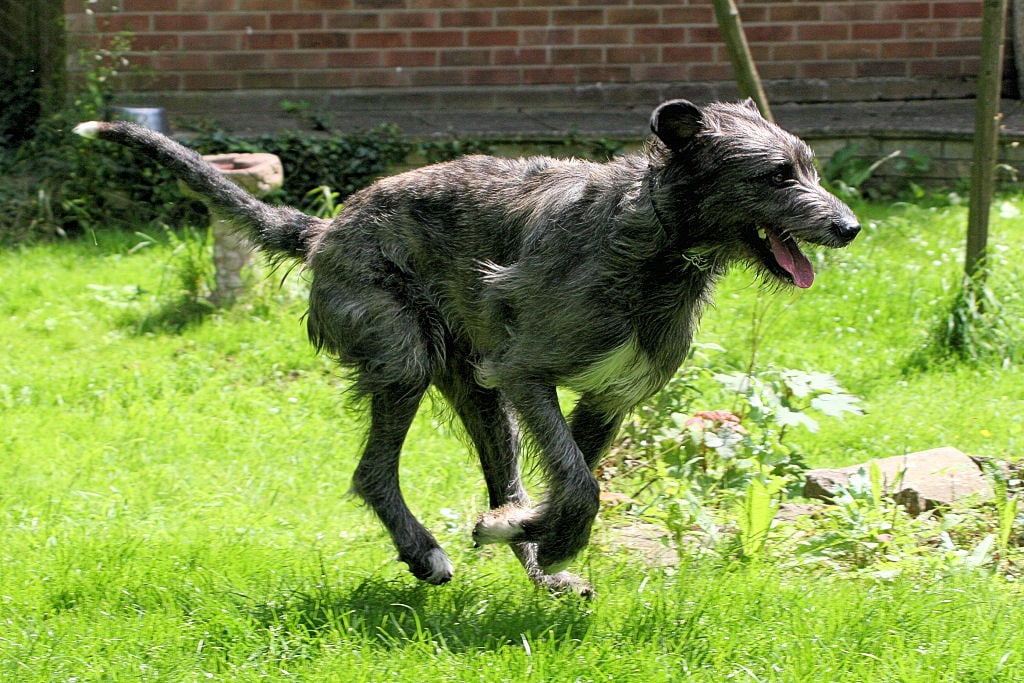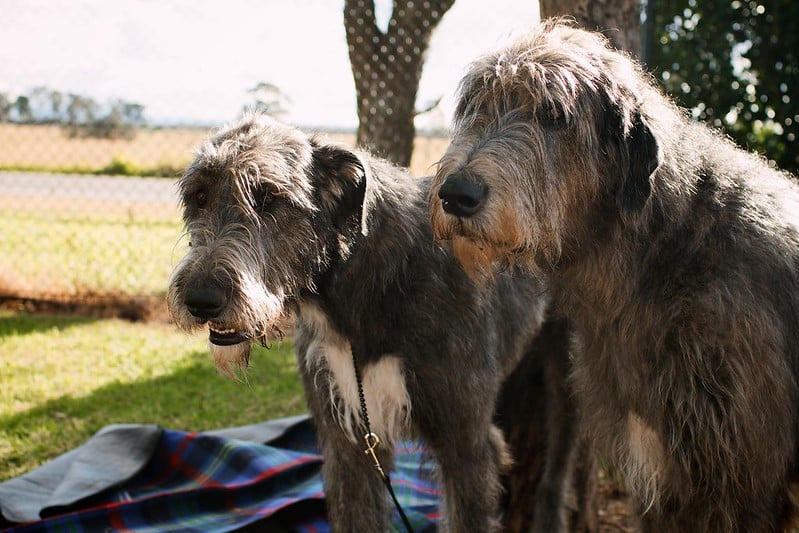If there’s one thing we can say about Irish Wolfhounds, it’s that these dogs definitely stand out from the crowd. Or, more accurately, they stand above it! These towering giants are one of the largest breeds in the canine kingdom.
A mainstay at Saint Patrick’s Day parades worldwide, the Irish Wolfhound may look imposing, but he couldn’t be sweeter. This easy-going dog is the very definition of a gentle giant.
Of course, every breed has its own set of pros and cons. This is why we’ve rounded up the essential facts you’ll want to know about this hound before jumping headfirst into puppy ownership.
Irish Wolfhound Puppy Facts
If you’re considering bringing home one of these amicable giants, you’ll need to brush up on your research first. To that end, we’re here to help! We’ve gathered all the important information about this breed to help you decide if an Irish Wolfhound puppy could fit into your life.
| Size | This is a giant breed. Wolfhound males can reach a height of 81 cm, while females will usually be around 76 cm tall. On average, males weigh somewhere in the neighbourhood of 54 kg, and females typically clock in at 48 kg. |
| Breed Characteristics | We’ve got two words for you: think big. These giant hounds are tall, muscular, and can weigh up to 82 kg! And yet, they still manage to pull off a graceful air that reminds us of a sleek Greyhound. Irish Wolfhounds sport a double-coat, with a stiff, wiry outer layer and a softer undercoat. They come in a variety of colours including white, grey, brindle, red, black and fawn. |
| Temperament | If a fierce watchdog is what you seek, you may want to reconsider bringing home one of these puppies. While they certainly appear intimidating, Irish Wolfhounds are famously gentle, patient, and rarely aggressive. These sensitive souls make wonderful playmates for children, although a Wolfhound’s immense size and playfulness could prove troublesome for a wobbly toddler.
Always a lover and never a fighter, Wolfhounds have no trouble making friends with anyone they meet—whether it’s the family cat or the stranger walking his dog across the street, a Irish Wolfhound will always be polite and friendly. They thrive on human companionship, so adopting one of these pups means you’ll have a devoted friend for life. |
| Grooming and Health Needs | Unless you plan on having your Wolfhound perform in the show ring, you won’t be overworked by a demanding grooming regime. Quite the opposite, you’re looking at a reasonable once-a-week brushing schedule. These dogs do shed, but only moderately, and they don’t go through any major seasonal sheds like most double-coated breeds.
Unfortunately, the staggering size of an Irish Wolfhound accounts for a few health problems seen in the breed. These dogs can suffer from bloat—a sudden and often fatal swelling of the stomach—as well as hip and elbow dysplasia, cardiomyopathy (an enlarged heart), von Willebrand’s disease (a bleeding disorder) and eye problems. Sadly, Irish Wolfhounds don’t have longevity on their side, and the average life expectancy of one of these dogs is capped at around seven years. |
| Training | With the proper motivation (think: yummy treats) and a positive, upbeat approach, training an Irish Wolfhound puppy shouldn’t be especially difficult. This is a highly intelligent breed, and they’re typically fast learners. Be sure to start training from a young age, so you can get your pup off to a good start in life. |
| Energy Level | Regular exercise is a must for this breed. A simple stroll through the neighbourhood should suffice, but if you’re up to it, Irish Wolfhounds also love competing in obedience, tracking, lure coursing and agility. Whatever your preference, just don’t neglect his exercise needs. A lazy Wolfhound is bound to pack on the pounds, which puts unwanted strain on his joints. |
| Life Expectancy | Sadly, the average lifespan of an Irish Wolfhound is a short six to eight years. |
Who Is The Best Human For An Irish Wolfhound Puppy?
While there’s plenty to love about this unique and immense hound, he’s not a perfect match for every household. For one thing, you’ll need to get perfectly honest with your ability to take care of such a large animal. Do you have the space to let him run and do you have the budget to feed him? Compared with a small or medium-sized dog, a Wolfhound can be demanding in terms of space and nutrition. They need a lot of both.
Ideally, an Irish Wolfhound will find himself in a home with a large fenced-in garden where he can safely blow off steam. Be prepared to share your furniture with this canine as well—PetMD points out that a Wolfhound’s large and bony body can suffer from calluses if they aren’t given a soft place to rest.
If you’re unsure about your patience when it comes to mischievous puppy antics, you may want to pass on Irish Wolfhound. Puppyhood in this breed can extend well beyond one year. Considering their giant size, this could pose some serious problems.
Size-related health issues are something else to consider. Wolfhounds commonly suffer from bloat, a life-threatening stomach condition, and they have a heartbreakingly short lifespan. You’ll need to ask yourself if is this something you’re willing to face as your hound gets older.
If you’re not deterred by a Wolfhound’s size or exercise needs, you’re in for a loveable and loyal companion. This breed thrives on human companionship, and they get along beautifully with children and other pets.
Getting An Irish Wolfhound Puppy
The decision to adopt or to work with a breeder for your new Irish Wolfhound puppy is a personal choice that requires research. Thankfully, there are many resources out there to help you find a rescue or a breeder who offers healthy, ethically-sourced Irish Wolfhound puppies.
Adopting an Irish Wolfhound puppy
It may come as a surprise, but adopting an Irish Wolfhound puppy is possible—though rare in the UK. Many breed rescues report that a majority of their homeless dogs come from individual owner surrender, with the most common reasons being a change in lifestyle or the breed not being right for them. This means that there may be many dogs and puppies out there that are looking for a new forever home.
The main difference between a breeder and a rescue is that a rescue may not always have young puppies to choose from. The benefit of this may mean that you have a dog who is already house-trained, microchipped and neutered. You may also find a Irish Wolfhound mix that has all the traits you want from the breed, but with a little extra thrown in. Some Irish Wolfhound breeders may also have older dogs up for rehoming.
Finding a rescue Irish Wolfhound can be as simple as searching the internet.
Finding an Irish Wolfhound breeder
The first step is to do your research. Sadly, there are many puppy mills posing as reputable breeders along with many online scams. Be aware, and reach out to different online forums for conversations about getting your future furry family member.
Be sure to ask questions, make arrangements to meet the parent dogs or—at the very least—the mother, and follow your gut. If something seems wrong at a breeder you visit, or the Irish Wolfhound puppy seems too good to be true, there’s likely something suspect going on. The Kennel Club also offers resources for finding a responsible breeder and a list of vetted breeders in its assured breeders scheme.
Knowing what you’re in for when you get an Irish Wolfhound puppy is an important step in being a responsible pet owner. Whether you find an ethical breeder or are planning to adopt, prepare yourself for a sweet-tempered and friendly addition to your household.
Irish Wolfhound Puppy Resources
After you find the right Irish Wolfhound puppy, it’s time to prepare your home! Here are a few resources to get you started.
- Tips on Surviving the First 24 Hours with Your New Puppy
- How Long Can You Leave a Puppy Alone?
- The Essential New Puppy Checklist
- How Often Should I Walk my Puppy?
- Puppy Training Resources
Featured image via Flickr/James Seattle
